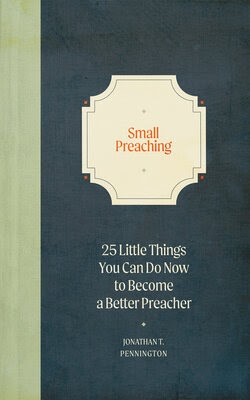In the practice of preaching, is there an effective method for how to start a sermon that will grab (and help keep) your listener’s attention?
In his book Small Preaching: 25 Little Things You Can Do Now to Become a Better Preacher, available now from Lexham Press, Professor and Preacher Jonathan T. Pennington says yes—by paying attention to one small thing every time.
***
All of us have enjoyed the diverse and wild-west world of YouTube. There is a video for everything, whether you want to learn to flush the heater core on a 2004 Mazda RX8, understand the difference between baroque and classical cellos, or watch Bad Lip Reading versions of the NFL, to name just a few of my own recent viewings.
I’ve recently seen another side of YouTube as the producer of a show.1 The “backside” of YouTube is their powerful “video analytics” mode that shows stunningly detailed data to the people who create and upload videos. I won’t scare you with the creepiness of how much they know about you demographically when you click on a video, but I will note this one interesting thing I’ve learned: most people make a snap decision within a few seconds about whether they are going to keep watching. Then, other mental windows of interest begin to close as time ticks along. If you and I aren’t immediately hooked by a particular video—either because of its quality, perceived lack of relevance, or something that turned us off—very rarely will we give it even a full minute of our time.
This is because the human brain has the huge and tiring job of analyzing the countless signals it is receiving from our neural network. Our brains have to make choices about what they will pay attention to. Things that don’t make sense, are irrelevant, or are poorly done will generally be judged, ignored, and forgotten. And all of this happens within seconds.
Now some may offer loud laments about the decreased attention spans of the younger generation (whippersnappers!), and it is true that the quick-fix mode of screen-based technologies can decrease our attentiveness. But we are talking here about something that is more than generational; it is biological.
If you’re still reading, then I’ve done a decent job of what I want you to take away from this essay. What I’ve written took less than a minute for you to read. If you’re still with me, then I must have said enough interesting, relevant, and comprehensible things for you to keep reading.
Here is why all this matters.
Tips for how to start a sermon that hooks listeners
That first minute of your sermon is absolutely crucial to your homiletical effectiveness. Yes, different people have different attention spans. Yes, some people will listen to you diligently and carefully even if your first minute isn’t very engaging. Yes, some people will be distracted or apathetic regardless of how well-crafted your first minute is. Yes, ultimately the Holy Spirit can do whatever he wants through the preaching of the Word.
But with all those qualifications in place, we can still recognize that from a rhetorical, homiletical, pedagogical, and neurological perspective—let’s just say it, a human perspective—that first minute of your sermon matters a lot. It is your responsibility as a preacher to craft the opening of your sermon with intentionality to grab and keep the attention of the easily distracted people hearing your voice. Here are some first-minute Don’ts and Dos.
Don’t:
- Step into the pulpit ill-prepared for the physical part of your work: check before the service starts that your mic works and the podium is the right height, that you know what the lights will look like in your eyes and on your manuscript when you are speaking, etc. Eliminate distractions that will hinder your homiletic opening.
- Start with time- and attention-wasting activities like turning on your mic, taking off your watch, drinking water—do all these things before you step into place or don’t do them at all.
- Start with self-deferential remarks—how you’re not that great of a preacher or not as good as someone else. Not only are these counterproductive to your goal and calling in preaching, [but] they are also almost certainly coming from insecurity hoping to be placated, not from a place of wisdom and strength.
- Start by talking about anything other than your sermon. Often guest speakers waste precious time thanking and praising their hosts. We get it. We don’t need it. Start preaching.
Demean your audience in any way. Adult learners will quickly withdraw from active participation if they are offended. Their windows will close.
Do:
- Start preaching immediately.
- Write out and memorize or nearly memorize your opening paragraphs. Your first words are vitally important, so craft them well and know them so you can be present and engage your audience by looking at them. And smile.
- Often start with a thoughtful question, one that engages the hearers’ minds in a genuine way.
- Often start with something humorous, intriguing, and/or personal. People are (usually [subconsciously]) deciding whether they like you, whether they can trust you, whether they want to listen to you. All the things you do in the first minute will contribute to that judgment and therefore to whether they will be open to the word of God that you are there to present.
So take the small step of working hard on that first minute of your sermon. This small investment pays big dividends.
***
Bigger isn’t always better, and that includes church ministry and preaching too. Start improving your sermons with simple but practical (and potentially revolutionary) tips in Small Preaching by Jonathan Pennington.

Related articles
- J. I Packer on Preaching and Listening to Sermons
- 8 Principles for Planning Your Preaching Calendar
- Preaching? Drain the Liquid before You Give It to Others
- Preaching to the Heart of the Asian American Experience
Related resources
- Lexham Press Preaching & Teaching Bundle (50 vols.)
- Theology Is for Preaching by Chase R. Kuhn and Paul Grimmond
- Preaching the Word with John Chrysostom
- Preaching Points: 55 Tips for Improving Your Pulpit Ministry by Scott M. Gibson
- Check out my Cars, Coffee, Theology YouTube channel.






